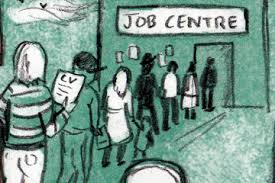The Second Sunday of Advent
“Prepare the way of the Lord, make straight his paths. Mk.1:2
The late-night comedians seem to have a lot of fun these days at the expense of Pope Francis. Fortunately, it’s usually good, clean fun.
Their amusement is very much based on the Pope’s honesty about his openly human qualities. Recently, for example, Francis opened up about some of the ordinary kinds of jobs he was involved in previous to his decision to become a priest.
Perhaps the most unusual aspect of his work history was the brief time when he worked as a bouncer at a nightclub!
This fact so amused one comedian that he suggested this may mean that “on Tuesday nights, ladies get into heaven free.”
Pope Francis is appealing to a lot of people precisely because of his remarkably human qualities. However, this is not meant in any way to mean that he is not offering a powerful and authoritative challenge to the world at large.
This is the same Pope, for example, who is telling each of us to “remove our sandals before the sacred ground of the other” – a phrase, I submit, we could all do well to meditate on.
This is the same Pope who is reminding us that it is in the “other” that we will find the face of God in our world.
This is the same Pope who goes a step further and insists that the face of God will most especially be found in the “other” who is immersed in poverty, who is sitting in a prison cell awaiting death, who is a homeless person panhandling for change, who is an immigrant without proper papers, who is a drug addict in the throes of withdrawal – or who is an unborn child in the womb of a poverty stricken mother.
This is no naïve Pollyanna Pope.
He is the same one who is challenging each one of us in the most uncomfortable and unfunny of ways. He’s the same Pope, for example, who is asking the priests and sisters and the shepherds of the church to “smell like the sheep,” to love more than judge, to not be “sourpusses.”
And that’s where John the Baptist comes into our discussion.
It would be plausible to describe John as a major “sourpuss.” After all, he’s pictured in today’s Gospel reading as wearing “clothing made of camel’s hair,” eating food consisting of “locusts and wild honey,” and of warning people “to flee from the coming wrath.”
Not exactly the type of person you’d be inviting to any of your Christmas parties!
Nevertheless, the Baptist was an important historical character who attracted a huge following – a following that continued long after his death.
He was so important and so significant, in fact, that Jesus himself felt compelled to listen to his preaching and be baptized by him in the river Jordan!
The reason the Baptist was so riveting a figure is the message that he delivered, along with the way in which he delivered it: with all the passion a human being could muster.
His message was this:
“Repent…Prepare the way of the Lord, make straight his paths.”
The Greek word that we translate into English as “repent” is metanoia – a word that means far more than to simply “be regretful” or “apologize.” The Greek word “meta” means “beyond” or “above”.
The word “noia” means “thought” or “mind.” Together they carry the meaning of:
Develop a whole new way of thinking; see the world in a new light; radically change the way you live.
In a word, become transformed.
The opposite of “metanoia,” then, is “paranoia.” This is a word we all recognize to mean becoming totally restricted in your way of thinking to the point of being paralyzed by fear.
“Metanoia,” repentance to the point of a total conversion, is a way of living that frees us to become fully alive people.
“Paranoia” is a way of living that creates a sense of misery and hopelessness, a way of living in which we become immersed in our own self.
Freedom vs. enslavement. Joy vs. sadness. Hope vs. despair.
This is the choice that both John the Baptist and Jesus himself urgently preaches each of us must make.
Where Jesus differs from John is that he enters into an utterly unique relationship with the Father – a Father that he calls Abba.
And, in doing so, he comes to realize that God is not One who calls us to “flee from the coming wrath.” Nor is he One who wants to judge and condemn.
Instead Jesus discovers that the Father is One who is mercy and compassion; One who is goodness and love; One who dines with his friends, as well as his enemies; One who heals and embraces; One who forgives and reconciles; One who throws his arms around and kisses the sinner; One who says “Neither do I condemn you;” One who wants nothing more than to call everyone together in a family of love and peace; One who, in the second reading we heard today, wants us all “to await new heavens and a new earth in which righteousness dwells;” One who wants us to live together in such a way that, as the prophet Isaiah dreams about in our first reading, “Here comes with power the Lord God … who, like a shepherd feeds his flock; in his arms he gathers the lambs, carrying them in his bosom, and leading the ewes with care.”
The very first Christian communities thought of themselves, above all, as followers of Jesus. For them, believing in Jesus meant walking in his “way.” The letter to the Hebrews calls it a “new and living way” that Jesus “opened up for us.” (Hebrews 10:20)
This, in fact, was why the very earliest followers of Jesus were called “the people of the Way” – even before they were called “Christians.”
Aside from all his human – sometimes humorous – ways of identifying with people throughout the world of today, this is the same “way” that Pope Francis is calling us all to embrace in our own day and age.
He’s truly echoing both John the Baptist and Jesus himself when he says in his own words: “Along this journey … we will have our moments of … darkness and fatigue.”
But then he tells us: “Challenges exist to be overcome! Let us be realists, but without losing our joy, our boldness, and our hope – filled commitment. Let us not allow ourselves to be robbed of missionary vigor.”
Perhaps this is another way of communicating to us today what John the Baptist and Jesus were saying to the people of another time:
“Prepare the way of the Lord, make straight his paths.”
Ted Wolgamot, Psy.D.






